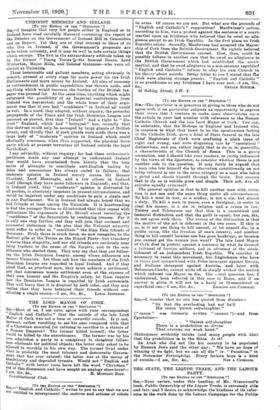[To TR! EDITOR OF THE " SPECTATOR.") Sm.—The Spectator is
so generous in giving to those who do not agree with it on particular subjects an opportunity to express their views that I venture to make some observations uptai the article in your last number with reference to the Roman Catholic Church and the late Lord Mayor of Cork. You say, in substance, that the Bishops in England and Ireland who, in response to what they knew to be the spontaneous feeling of the Catholic Irish, gave a kind of State funeral to the late Chief Magistrate of Cork were confusing a plain issue of right and wrong, and were disguising tais by " casuistical " distinctions, and you rather imply that to do so is, generally, a characteristic of the Church of Rome. This is a grave accusation, and I should like your readers, so justly influenced by the views of the Spectator, to consider whether there is not another side to the question. It may fairly be argued that a man who lets himself die by starvation conditionally on not being released is not in the same category as a man who takes a pistol and shoots himself through the brain. But assume that to do so is suicide pure and simple. Then ask, Are all suicides equally criminal?
The general opinion is that to kill another man with inten- tion is not one and the same thing under all circumstances. To kill a man in war, as a soldier, is not a sin, but almost a duty. To kill a man in peace, even a foreigner, in order to steal his money, is a sin in religion and a crime in law. Tolstoy and Tolstoyans say that this is a casuistical and immoral distinction and that the guilt is equal; but you. Sir, do not agree with them. The reason of the distinction is that the motive of the act is different in the two cases. If this is so, is it not one thing to kill oneself, or let oneself die, in a public cause, like the freedom of one's country, and another thing to kill oneself because one has gone bankrupt, or because you cannot get the woman you want? The late Lord Mayor of Cork died in protest against a sentence by what he deemed a tribunal of foreign soldiers, and in advocacy of the estab- lishment of an independent Irish Republic. We consider it necessary to resist this movement, but Englishmen who have in times past sympathized with Poles insurgent against Russia, and Italians insurgent against Austria, and later with Bohemian-Czechs, cannot write off as simply wicked the motive which induced tee Mayor to die. The ...oral question has, I understand, been referred in this case to Rome, and if an answer is given it will not be a hasty or ill-oonsidered or
superficial one.—I am, Sir, &c., ENGLISH AND CATHOLIC.






































 Previous page
Previous page